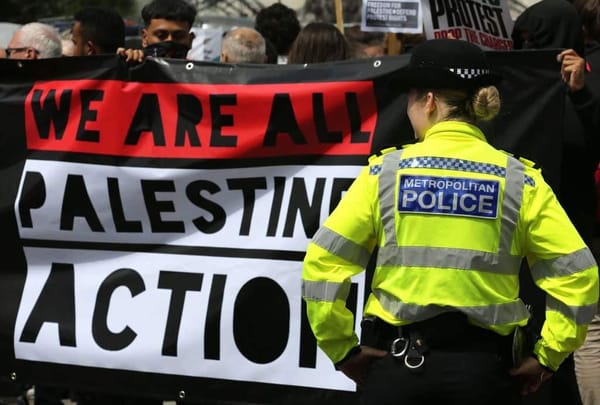Access to puberty blockers is a Jewish issue
The UK’s ban is transphobic, unscientific, and in opposition to core Jewish values.

At the end of November 2020, a verdict was reached in the case of Keira Bell vs Tavistock. The court ruled in favour of Bell, a former patient at the Tavistock’s Gender Identity Development Service (GIDS), who was challenging the prescription of puberty blockers to children. Puberty blockers temporarily inhibit the hormones that trigger puberty-related changes to the body, giving trans youth the option to pause the development of unwanted secondary sexual characteristics. For context, in 2011, the age limit for prescribing puberty blockers was lowered from 16 to around 11, following nearly a decade of consultation with experts. This decision overturns that change and drastically restricts young trans people’s access to puberty blockers, which for many can be vital healthcare.
Many children who identify as trans face the challenges of going through puberty exacerbated by doing so in bodies that conflict with who they know themselves to be. Blockers are safe, are prescribed to children on the NHS, and have been used for decades in many countries – not just to assist trans and gender non-conforming children, but for children with precocious puberty.
Gender dysphoria, the medical term for the feeling of your body being at odds with your gender, is deeply painful for children and adults alike, making us strangers in our own skin. It takes exploration, counselling, a robust trans and queer community, and for many people, medical transition, to make us shalem – whole in body, mind and spirit. This is compounded from the outside: when society normalises misinformation about trans people and contributes to a world that is still hostile to us, accessing transition is only one barrier we face. Though I may now be over a decade on from my transition, transphobia remains rampant in the media, with legislation passing in multiple countries that threaten trans people’s right to participate and thrive in society. It’s a scary, exhausting time to be trans – not just in the UK, but around the world.
Opposition to the use of puberty blockers by GIDS is fuelled by the sinister assumption that it is wrong or undesirable to be trans. Keira Bell stated that doctors should “help” trans people to “reconcile with their sex”, a practice that no reputable clinician would support. The reason why many teenagers who take puberty blockers go on to transition is because they were correctly identified as being trans. Rates of detransition are extremely low and are usually caused by external factors, such as transphobia. Treatment with puberty blockers has been empirically proven to lead to better outcomes for trans youth compared to transitioning in adulthood.
I transitioned at the age of 15. I was prescribed testosterone at 16, and took the summer to socially transition before going back to my Sixth Form as a boy. Thirteen years later, I’m an active member of two synagogues. I have a job. I have a flat in the North West London Jewish enclave with my cat and my boyfriend. My ongoing hormone treatment is a two-minute, virtually painless injection. Some people have suggested that my experience is anomalous but that’s untrue. I’m still in touch with many trans friends I met through organisations like Mermaids and Gendered Intelligence, and our stories are all similar. With supportive, affirming parents and the right treatment, we have been able to lead vibrant and fulfilling lives.
It’s true that hormones aren’t antidepressants º they’re not meant to be. But they did allow me to finish my studies and start working, without constantly worrying about how I was perceived or struggling through the medical system.
No young people who had taken puberty blockers or their parents were allowed to give evidence in the Keira Bell vs Tavistock case. Despite this omission of crucially relevant testimony, the court ruled that young people aged 16 or younger must ask courts if they want puberty blockers, presenting a huge barrier to healthcare. As trans jurist and bioethicist Florence Ashley argues, these findings contradict standard medical practice for similar treatments, such as hormonal contraception. In the last few days, and after a four month wait, this ruling has been overturned by the High Court, which concluded that parents can consent to their child accessing puberty blockers, without needing to go to court. However, for trans children with unsupportive family networks the path ahead remains unclear.
There were many reactions to the initial ruling, ranging from anger to celebration. Journalist Hadley Freeman, who consistently criticises moves towards trans inclusion, even compared puberty blockers to Nazi experimentation. Aside from its inaccurate and offensive nature, such allusions overlook the fact that the Nazis destroyed the largest repository of trans and queer healthcare documents of its time. Putting advocates for trans healthcare in the same category as their persecutors is reprehensible.
Instead of paying heed to hateful tweets, the people we should be listening to are the parents who are considering leaving the UK to get better medical treatment for their children. We should be hearing from the trans teenagers who have had their medicine withdrawn overnight without a timeline or process in place; the trans youth who have spent years jumping through the medical system’s hoops only to have the door shut in their faces.
In December one of these parents told Pink News: “My daughter is almost 13 and has been under the care of the Tavistock for over five years […]. When she returned to school in September, one boy in her class had grown facial hair over the summer and she came home sobbing in terror at the idea that might happen imminently. She didn’t sleep for a week…At her worst times, the only comfort I am able to offer…is that blockers are coming […]. Yesterday’s judgement has torn that hope from her, and from us as parents.”
***
While a few individual synagogues and communities have celebrated and affirmed trans Jews, there remain Jewish spaces where it is actively dangerous to be out as trans. Svara, the queer radical yeshiva, was founded to provide a specifically queer space for marginalised Jews to come together and learn. Svara’s inclusive, liberatory ethos extends to to its textual interpretations: the yeshiva applies traditional Torah ideas to queer and trans lives. For example, the Talmud teaches that if someone claims to be too ill to fast on Yom Kippur, we should provide them with food, regardless of whether any experts are there to assess their condition. The principle derives from the statement in Proverbs that “The heart knows the bitterness of its soul.” The Talmudic position is that those in pain are the true experts as to the extent of their suffering and know the means to relieve it. Who better to trust about their own suffering, their own lives, than a trans person?
Last November, I helped to organise the first trans-led Trans Day of Remembrance Kabbalat Shabbat service to be held in a UK Reform synagogue. One of the participants, Chava, says that the Keira Bell vs Tavistock verdict will only push trans people to self-medicate, especially those who are poor: “I work to provide access to hormones for trans people outside of the medical system, advising trans people on how they can safely buy hormones and monitor their hormone levels. Trans people already have to wait years for one appointment at a Gender Identity Clinic. Once there, they can face clinicians who box trans people into strict binary categories, often denying our humanity and individuality. The outcome of the court case will do nothing to ensure that trans young people are kept safe, it will only make them feel more isolated and desperate than ever before. Restricting access to HRT and trans medical care doesn’t just impact trans people as a whole: we have to remember that this harms poor trans people disproportionately, especially trans people of colour.”
The same chapter in Proverbs tells us that ‘a truthful witness saves lives’ (14:25). The media’s endless churn of sensationalised stories about trans people has drowned out perspectives from trans people. I want non-trans people to see how our lives change when we’re given medical treatment to fit our needs. I want stories about trans young people with supportive parents who are flourishing at school and with their peers. I want a discussion about medical interventions and transition to include trans people and trans or gender-nonconforming youth as the experts of our own experiences.
Last year, I had my own simcha [celebration] celebrated at my synagogue. I was given a special aliyah [call to the Torah] to mark receiving my Gender Recognition Certificate, 12 years after I first knew I was a boy at 15 years old. It opened up a space for our community to say: we welcome you. Public celebration of trans life is feared by people who see being trans as shameful or dishonest, who see young people (and older people) coming out as a threat. But acknowledging that we need to be listened to about our own lives and journeys is how I read that Talmudic teaching into my own life. This was denied during the court proceedings and it will result in further suffering for so many individuals and their families. Young people who are taking puberty blockers or opting for HRT, or who are exploring what their gender means to them, aren’t restricting their lives, they are beginning to live them. ▼
Isaac Elijah is a member of several Masorti Jewish spaces and active within his synagogue community’s anti-racism work.




